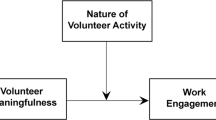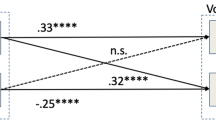Abstract
The Corporation for National and Community Service defines professional skills-based community service as “the practice of using work-related knowledge and expertise in a volunteer opportunity.” Traditional definitions of volunteer work in organizational communication scholarship, however, are typically based on (1) the bifurcation between work and volunteer activity; (2) low barriers to volunteer entry and exit; (3) the lack of managerial power/control over volunteers; and (4) the altruistic focus of volunteer work. An analysis of interviews with 19 skills-based volunteers highlights the identity and role tensions inherent in professional volunteering and serves as the basis for a proposal for a new way to visualize volunteering characterized by spectrums of tension rather than by the traditional lens of “not work.”
Résumé
La Corporation for National and Community Service (corporation pour les services nationaux et communautaires) définit les services communautaires professionnels offerts sur la base des compétences comme « la pratique consistant à utiliser des connaissances et de l’expertise professionnelles à des fins bénévoles ». Cependant, les définitions traditionnelles du travail bénévole que l’on retrouve dans les documents académiques sur les communications organisationnelles se basent typiquement sur (1) la bifurcation entre les activités professionnelles et bénévoles ; (2) les faibles obstacles à l’entrée et à la sortie des bénévoles ; (3) le manque de contrôle/d’encadrement des bénévoles ; et (4) l’aspect altruiste du travail bénévole. Une analyse d’entrevues menées auprès de 19 bénévoles offrant des services sur la base de leurs compétences lève le voile sur les tensions entre identités et rôles inhérentes au bénévolat professionnel, et sert de fondement pour proposer un nouveau mode de visualisation de celui-ci en le caractérisant par des spectres de tensions plutôt qu’à travers le prisme traditionnel du « non-travail ».
Zusammenfassung
Die Corporation for National and Community Service definiert professionelle und qualifizierte Gemeindedienstleistungen als „die Praxis, arbeitsbezogene Kenntnisse und Expertise in einer ehrenamtlichen Tätigkeit anzuwenden“. Die traditionellen Definitionen von ehrenamtlicher Arbeit im Wissenschaftsbereich Organisationskommunikation beruhen jedoch typischerweise auf (1) der Teilung von Arbeit und ehrenamtlicher Tätigkeit, (2) den niedrigen Barrieren für die Aufnahme und Beendigung einer ehrenamtlichen Tätigkeit, (3) der nicht vorhandenen Führung oder Kontrolle gegenüber anderen Ehrenamtlichen und (4) dem altruistischen Fokus der ehrenamtlichen Arbeit. Eine Analyse von Interviews mit 19 fachlich qualifizierten Ehrenamtlichen stellt die Identitäts- und Rollenkonflikte heraus, die mit einer professionellen ehrenamtlichen Tätigkeit einhergehen, und dient als Basis für einen Vorschlag, die ehrenamtliche Arbeit als eine von Spannungen gekennzeichnete Tätigkeit neu zu visualisieren statt durch die traditionelle Perspektive der „Nicht-Arbeit“ zu betrachten.
Resumen
La Corporación para el Servicio Nacional y Comunitario define el servicio a la comunidad profesional basado en competencias como “la práctica de usar el conocimiento y la pericia relacionados con el trabajo en una oportunidad como voluntario.” Las definiciones tradicionales del trabajo voluntario en los estudios académicos sobre comunicación organizativa, sin embargo, se basan normalmente en (1) la bifurcación entre el trabajo y la actividad de voluntario; (2) barreras bajas para la entrada y salida de voluntarios; (3) la falta de poder/control de la gestión sobre los voluntarios; y (4) el enfoque altruista del trabajo del voluntario. Un análisis de entrevistas de 19 voluntarios basados en las competencias resalta la identidad y las tensiones de rol inherentes al voluntariado profesional y sirve de base para una propuesta para una nueva forma de visualizar el voluntariado caracterizada por espectros de tensión en lugar de por la lente tradicional de “no trabajo”.
Chinese
国家和社区服务公司将基于职业技能的社区服务定义为“在志愿机会中使用工作相关的知识和专业知识的实践”。传统的志愿定义适合组织沟通学术研究;然而,通常基于 (1) 工作和志愿活动之间的分歧;(2) 较低的志愿进入和退出障碍;(3) 缺少志愿的管理能力/控制;和 (4) 志愿工作的无私重点。对19位基于技能的志愿者采访的分析突出了职业志愿内在的身份和角色压力,作为新的可视化使用压力范围而不是传统“不运行”视角特性化的建议书的基础。
Arabic
المؤسسة للخدمة الوطنية والمجتمع توضح المهارات المهنية على أساس خدمة المجتمع القائم على إنها “ممارسة إستخدام عمل ذوصلة بالمعرفة والخبرات في فرصة التطوع”. التوضيح التقليدي للعمل التطوعي في منحة التواصل التنظيمية، مع ذلك، عادة ما تكون على أساس(1) التشعب بين العمل والنشاط التطوعي؛ (2)إنخفاض حواجز لدخول التطوع و الخروج؛ (3) عدم وجود السلطة الإدارية/السيطرة على المتطوعين؛ (4) التركيز الغير أناني للعمل التطوعي. تحليل لمقابلات مع19 متطوع قائم على أساس المهارات يسلط الضوء على هوية ودور التوترات المتأصلة في التطوع المهني ويخدم كأساس لإقتراح لطريقة جديدة لتصور التطوع يتميز بأطياف التوتر بدل من العدسة التقليدية “لا تعمل .”

Similar content being viewed by others
Change history
11 April 2018
The PDF version of this article was reformatted to a larger trim size
References
Ashcraft, K. L., & Kedrowicz, A. (2002). Self-direction or social support?: Nonprofit empowerment and the tacit employment contract of organizational communication studies. Communication Monographs, 69(1), 88–110. https://doi.org/10.1080/03637750216538.
Baxter, L. A., & Babbie, E. (2004). The basics of communication research. Belmont, CA: Wadsworth.
Botero, I. C., Fediuk, T. A., & Sies, K. M. (2013). When volunteering is no longer voluntary: Assessing the impact of student forced volunteerism on future intentions to volunteer. In M. W. Kramer, L. K. Lewis, & L. M. Gossett (Eds.), Volunteering and communication: Studies from multiple contexts (Vol. 1, pp. 297–319). New York, NY: Peter Lang.
Braun, V., & Clarke, V. (2006). Using thematic analysis in psychology. Qualitative Research in Psychology, 3(2), 77–101. https://doi.org/10.1191/1478088706qp063oa.
Brown, E., & Ferris, J. M. (2007). Social capital and philanthropy: An analysis of the impact of social capital on individual giving and volunteering. Nonprofit and Voluntary Sector Quarterly, 36(1), 85–99. https://doi.org/10.1177/0899764006293178.
Bureau of Labor Statistics—US Census Bureau. (2016). Volunteering in the United States—2015 [Press release]. Retrieved from http://www.bls.gov/news.release/volun.htm.
Carson, E. D. (1999). Comment: On defining and measuring volunteering in the United States and abroad. Law and Contemporary Problems, 62(4), 67–71. https://doi.org/10.2307/1192267.
Corporation for National and Community Service. (2014). Toward a New Definition of Pro Bono: Frequently Asked Questions. Retrieved from https://www.nationalserviceresources.gov/pro-bono-faq#.VCmfQGddXl4.
Corporation for National and Community Service- Office of Research and Policy Development. (2008). Capitalizing on volunteers’ skills: Volunteering by occupation in America Retrieved from Washington, DC: http://www.nationalservice.gov/pdf/08_0908_rpd_volunteer_occupation.pdf.
Erlinghagen, M., & Hank, K. (2006). The participation of older Europeans in volunteer work. Ageing and Society, 26(4), 567–584. https://doi.org/10.1017/S0144686X06004818.
Hager, M. A., & Brudney, J. L. (2004). Balancing act: The challenges and benefits of volunteers. Retrieved from Washington, DC: http://www.urban.org/uploadedpdf/411125_balancing_act.pdf.
Handy, F., Cnaan, R., Brudney, J., Ascoli, U., Meijs, L. M. P., & Ranade, S. (2000). Public perception of “who is a volunteer”: An examination of the net-cost approach from a cross-cultural perspective. Voluntas: International Journal of Voluntary and Nonprofit Organizations, 11(1), 45–65. https://doi.org/10.1023/A:1008903032393.
Haski-Leventhal, D., & Bargal, D. (2008). The volunteer stages and transitions model: Organizational socialization of volunteers. Human Relations, 61(1), 67–102. https://doi.org/10.1177/0018726707085946.
Iverson, J. O. (2013). Communicating belonging: Building communities of expert volunteers. In M. W. Kramer, L. K. Lewis, & L. M. Gossett (Eds.), Volunteering and communication: Studies from multiple contexts (Vol. 1, pp. 45–64). New York: Peter Lang.
Kramer, M. W., Lewis, L. K., & Gossett, L. M. (Eds.). (2013). Volunteering and communication: Studies from multiple contexts (Vol. 1). New York, NY: Peter Lang.
Lewis, L. K. (2005). The civil society sector: A review of critical issues and research agenda for organizational communication scholars. Management Communication Quarterly, 19(2), 238–267. https://doi.org/10.1177/0893318905279109.
Lewis, L. K. (2013). An introduction to volunteers. In M. W. Kramer, L. K. Lewis, & L. M. Gossett (Eds.), Volunteering and communication: Studies from multiple contexts (Vol. 1, pp. 1–24). New York, NY: Peter Lang.
Lindlof, T. R., & Taylor, B. C. (2002). Qualitative communication research methods. Thousand Oaks, CA: Sage.
McAllum, K. (2013). Challenging nonprofit praxis: Organizational volunteers and the expression of dissent. In M. W. Kramer, L. K. Lewis, & L. M. Gossett (Eds.), Volunteering and communication: Studies from multiple contexts (Vol. 1, pp. 383–404). New York, NY: Peter Lang.
McAllum, K. (2014). Meanings of organizational volunteering: Diverse volunteer pathways. Management Communication Quarterly, 28(1), 84–110. https://doi.org/10.1177/0893318913517237.
McBride, A. M., Gonzales, E., Morrow-Howell, N., & McCrary, S. (2011). Stipends in volunteer civic service: Inclusion, retention, and volunteer benefits. Public Administration Review, 71(6), 850–858. https://doi.org/10.1111/j.1540-6210.2011.02419.x.
McNamee, L. G., & Peterson, B. L. (2014). Reconciling “third space/place”: Toward a complementary dialectical understanding of volunteer management. Management Communication Quarterly, 28(2), 214–243. https://doi.org/10.1177/0893318914525472.
Musick, M. A., & Wilson, J. (2008). Volunteers: A social profile. Bloomington, IN: Indiana University Press.
Omoto, A. M., & Snyder, M. (2002). Considerations of community: The context and process of volunteerism. American Behavioral Scientist, 45(5), 846–867. https://doi.org/10.1177/0002764202045005007.
Pearce, J. (1993). Volunteers: The organizational behavior of unpaid workers. New York, NY: Routledge.
Penner, L. A. (2002). Dispositional and organizational influences on sustained volunteerism: An interactionist perspective. Journal of Social Issues, 58(3), 447–467. https://doi.org/10.1111/1540-4560.00270.
Scott, C. R., & Stephens, K. K. (2009). It depends on who you’re talking to…: Predictors and outcomes of situated measures of organizational identification. Western Journal of Communication, 73(4), 370–394. https://doi.org/10.1080/10570310903279075.
Trethewey, A., & Ashcraft, K. L. (2004). Special issue introduction. Practicing disorganization The development of applied perspectives on living with tension. Journal of Applied Communication Research, 32(2), 81–88. https://doi.org/10.1080/0090988042000210007.
Wilson, J., & Musick, M. (1997). Who cares? Toward an integrated theory of volunteer work. American Sociological Review, 62(5), 694–713. https://doi.org/10.2307/2657355.
Wilson, A., & Pimm, G. (1996). The tyranny of the volunteer: the care and feeding of voluntary workforces. Management Decision, 34(4), 24–40. https://doi.org/10.1108/00251749610115134.
Author information
Authors and Affiliations
Corresponding author
Rights and permissions
About this article
Cite this article
Steimel, S. Skills-Based Volunteering as Both Work and Not Work: A Tension-Centered Examination of Constructions of “Volunteer”. Voluntas 29, 133–143 (2018). https://doi.org/10.1007/s11266-017-9859-8
Published:
Issue Date:
DOI: https://doi.org/10.1007/s11266-017-9859-8




